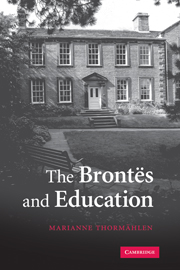Book contents
- Frontmatter
- Contents
- Acknowledgements
- Abbreviations and editions
- Introduction
- I EDUCATION AND SOCIETY
- II HOME AND SCHOOL
- III SUBJECTS AND SKILLS
- 7 A sound English education
- 8 Religion and education
- 9 The accomplishments
- 10 Male and female education
- 11 Beyond the schoolroom: reading and the Brontës
- IV STRATEGIES AND METHODS
- V ORIGINALITY AND FREEDOM
- Notes
- Select bibliography
- Index
7 - A sound English education
Published online by Cambridge University Press: 22 September 2009
- Frontmatter
- Contents
- Acknowledgements
- Abbreviations and editions
- Introduction
- I EDUCATION AND SOCIETY
- II HOME AND SCHOOL
- III SUBJECTS AND SKILLS
- 7 A sound English education
- 8 Religion and education
- 9 The accomplishments
- 10 Male and female education
- 11 Beyond the schoolroom: reading and the Brontës
- IV STRATEGIES AND METHODS
- V ORIGINALITY AND FREEDOM
- Notes
- Select bibliography
- Index
Summary
An establishment or a governess that offered pupils ‘a sound English education’ taught English grammar and literature, geography, history and a little arithmetic. The rudiments of natural science might be imparted, too, with a heavy emphasis on ‘natural history’. In addition, any girl who received any kind of organised education would be taught needlework commensurate with her social status. All these subjects were what the Brontë sisters learnt, taught and proposed to teach, and all of them feature in their fiction.
GEOGRAPHY
One of the sound-English-education subjects stands out in Charlotte Brontë's novels because of the seniority of those who teach it. Geography is the province of the directresses at Lowood and in Madame Beck's pensionnat (Jane Eyre I.v.47–8, Villette XV.153 and XXXV.398), and this is no accident. In the early nineteenth century geography was, in the words of a contemporary manual called The Complete Governess, felt to constitute ‘a sort of connecting link for all our knowledge’. At best, geography instruction supplied knowledge of the parts of the world and their interrelations; the various European countries and their distinctive characteristics and boundaries; geological facts and conditions; different climates all over the world and the factors that influence them; and the branches of industry and agriculture that created the wealth of individual nations. At worst, geography consisted in the rote-learning of ‘facts’ the significance of which was completely incomprehensible to the learner, as well as of lists of rivers, towns, bays and so on whose essential characteristics, including location and relative importance, remained unknown.
- Type
- Chapter
- Information
- The Brontës and Education , pp. 81 - 96Publisher: Cambridge University PressPrint publication year: 2007



